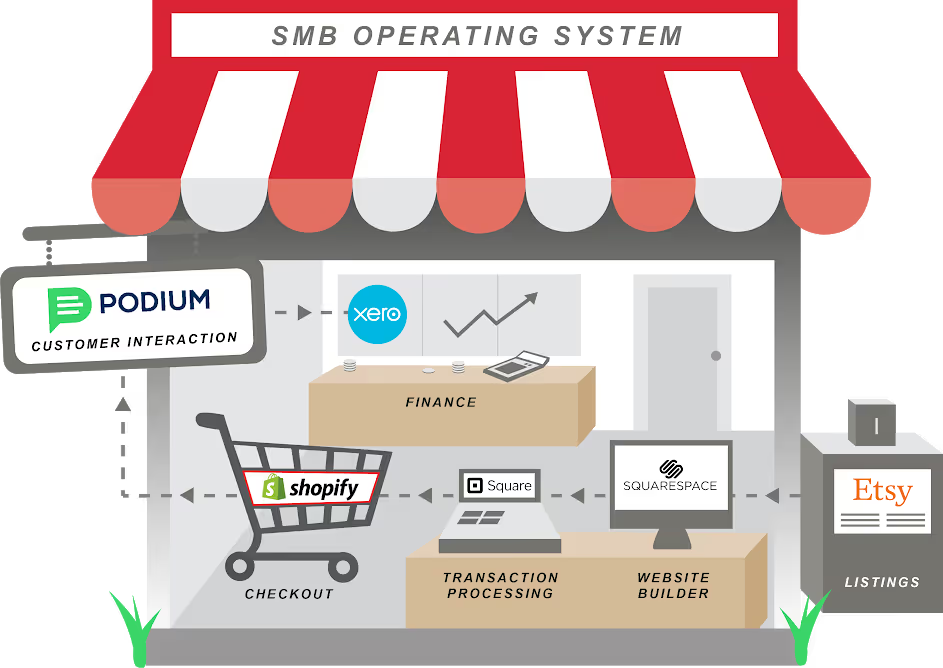Global Reach, Local Empathy: The Companies Powering the Future of Retail

At Accel, we believe in the concept of a Prepared Mind -- the practice of forming viewpoints and cultivating relationships within a focused set of technology initiatives. Back around 2011, we began to observe that local merchants were adopting new tools to compete in a world where e-commerce was rapidly gaining mindshare. The following is our reflection on how those tools have helped merchants to thrive, and how they’ve built themselves into formidable companies along the way. We also take a look at what’s next in this category that we call “the Small and Medium-Sized Business Operating System” -- or SMB OS.
If you’ve read the news or followed the stock market over the last two years, you’re likely aware of Amazon’s historic growth. And if you happen to have shopped at Whole Foods (owned by Amazon), streamed a show on Netflix (hosted by Amazon Web Services) or watched the Oscar-winning film Manchester by the Sea (produced by Amazon Studios), you’ve benefited from the company’s enormous reach. Yet as the online juggernaut appears poised to eclipse a trillion dollar market cap, something else remarkable is happening in its core market of selling goods to consumers – the tools empowering small business owners to “build local” are experiencing a renaissance of their own.

Against this backdrop, companies providing products that allow local merchants to amplify their brands and run their businesses independently are thriving. Consider Etsy (a platform for artisans to sell handicrafts online), Shopify (eCommerce software), Square (transaction processing), Squarespace (website creation) and Xero (cloud-based accounting software).
Together we think of these tools as the “SMB OS,” a menu of the category-leading products that are selected disproportionately to provide local merchants with the technology firepower they need in the war against Amazon.
While these companies may compete at times for customer mindshare, they are most often deployed alongside one another to address related business owner needs. Through open APIs or direct partnerships, they have established seamless integrations such that store owners can cherry-pick the solutions that solve their unique requirements, and combine them effortlessly. For example, through the Xero app marketplace, you can connect your accounting software with Shopify, Square or Squarespace, plus over 100 other systems to address business-specific challenges like inventory management, customer relationship management, employee time tracking, payroll and more.
This competitive camaraderie has at once delighted customers and elevated the entire category: the basket of publicly traded “SMB OS” companies has outpaced Amazon, even amidst the company’s historic run. Shopify and Square have become $15 billion businesses, Xero joined the ASX 200 Index, and while Amazon Handmade was supposed to be a death blow for Etsy, the handicraft marketplace is executing on a remarkable turnaround, fresh off its first billion-dollar quarter behind the strategy of “Keep Commerce Human.”
Powering the Voice of the Local Customer: Meet Podium
At the heart of local commerce is the direct relationship between merchant and customer. In today’s world we may be shopping for higher-volume products (I still enjoy the pleasant in-person hello from a Starbucks barista) and we leverage modern communication channels (the appointment reminder text from my dentist is a major convenience). But the one-to-one interaction is an indelible hallmark of local business and the key differentiator that sets small businesses apart from Amazon. More than just a pleasant interaction, the direct connection helps the seller understand the needs of the buyer, and optimize the business accordingly. As more and more merchants seek tools to amplify the voice of the customer, the latest addition to the SMB OS is the company leading this wave: Podium.
Podium began with the insight that small businesses need help getting themselves found online. They lack the budget and marketing teams to drive Google AdWords strategies, but they know that increasingly customers are talking about them and forming purchase decisions on popular review sites. So Podium initially provided tools to help business owners increase their exposure on the review sites that matter most to them- from the largest review communities (Facebook and Google) to review sites like Yelp and the vertical-specific destinations that shape opinions in certain categories (Cars.com, DealerRater and Edmunds.com in auto, Avvo and Lawyers.com in legal, HealthGrades and Zocdoc in medical, Zillow and Redfin in real estate, etc). The world was seeing an explosion in review sites and business owners struggled to stay relevant and internalize feedback across all of them. Podium solved this problem, and in the process touched off a positive feedback loop: a merchant takes pride in providing a good or service and encourages its customers to leave a positive review of that good or service. This delights the merchant, who strives to maintain the quality of service for the next customer who walks through the door and so on. Podium’s customers responded favorably and with minimal outside funding, the company has grown 900% in 3 short years.
But that initial touch point between the local merchant and the local customer - “how’d you like our service?” – initiated a much broader and ongoing dialogue. Customers wanted the convenience of that interaction to extend to every other correspondence with a business from scheduling appointments, to follow-up service reminders, to questions about inventory, hours, new products, etc. Put simply, messaging with a business should be as easy as texting with a friend. For internet companies, this has become a well-addressed need with startups like Intercom reaching “unicorn” valuations and incumbents like Salesforce offering live chat products for companies whose business is online. But what about the offline businesses that comprise 80% of the economy? For shop owners, restaurants, doctors, dentists, auto dealerships, and every brick-and-mortar entrepreneur trying to amplify the voice of the customer, Podium today powers local interaction.
Over 17,000 businesses use Podium Messenger daily to reach customers through the channels most convenient to them. Whether through text, Google Click-to-Message, Facebook Messenger or other outlets, Podium is the platform underpinning the modern customer dialogue. At Accel, we believe the best companies are well attuned to the feedback of their users, so we’re proud to back Podium in its journey to amplify the voice of the customer for local businesses around the world.
Why Local Tools Are Winning: The Case for the SMB OS
Local merchants are using the SMB OS to craft their own commerce solutions – here’s why:
- The Future is Omnichannel: Retailers today need to reach consumers in person, online and increasingly via their phones—it’s why 60% of Shopify merchants are selling across two or more channels. Amazon offers unparalleled reach online, but inherently falls short of powering a unified multichannel experience.
- Tools That Grow with You: Whether they’re accessing growth capital through Square Finance or graduating from Shopify Lite to Shopify Advanced to Shopify Plus (which now supports Tesla, Hallmark, and Bose), merchants want scalable tools that help them expand and provide a more bespoke experience for each phase of growth.
- Open Ecosystem vs. Closed: Amazon’s cookie-cutter storefront looks all the more rigid when compared to the vibrant shopping experiences enabled by combining Apple Pay at checkout, Instagram tie-ins to get ads in front of customers, Facebook chat for customer support, and more—all simple integrations made easy with the SMB OS.
- Own Your Brand Identity: Just as you’d want your physical storefront to reflect your business’ unique value prop and character, your online presence should similarly set your business apart. The SMB OS offers merchants the creative license to shape the aesthetics of their website, influence SEO and—importantly—handle customer interactions with a personalized touch.
- Considered Purchases: Local business does not have to mean small ticket size. Cars, furniture, solar panels and medical procedures are examples of higher-priced items that are rarely purchased without a visit to a store. The same is, of course, true for service providers (doctors, dentists, mechanics, etc.). Amazon cannot meet the needs of these business owners, who still want to advertise online, process payments, interact with customers and more.
- A Sense of Community: SMB OS companies offer products crafted with empathy for the independent merchant because many are themselves rooted in local commerce. Tobi Lutke founded Shopify to address the needs of his small snowboard shop. Eric Rea launched Podium to help out his dad’s tire shop in Alberta and operated the business from an apartment above a Provo bike shop. Perhaps it’s not coincidental these companies come from Lehi, Brooklyn, New Zealand, and Ottawa; there’s a solidarity shared by community merchants taking on a looming disruptor.
It’s possible we are experiencing the beginning of a “barbell effect” in US retail, with Amazon growing on one end and local commerce on the other, while a thinning out occurs in the middle (Toys R Us, Claire’s, etc.). The retailers who thrive will be the ones building empathy for the local shopper into the commerce experience, and we’re excited at Accel to continue backing the entrepreneurs who are shaping the future of retail.
Great companies aren't built alone.
Subscribe for tools, learnings, and updates from the Accel community.


